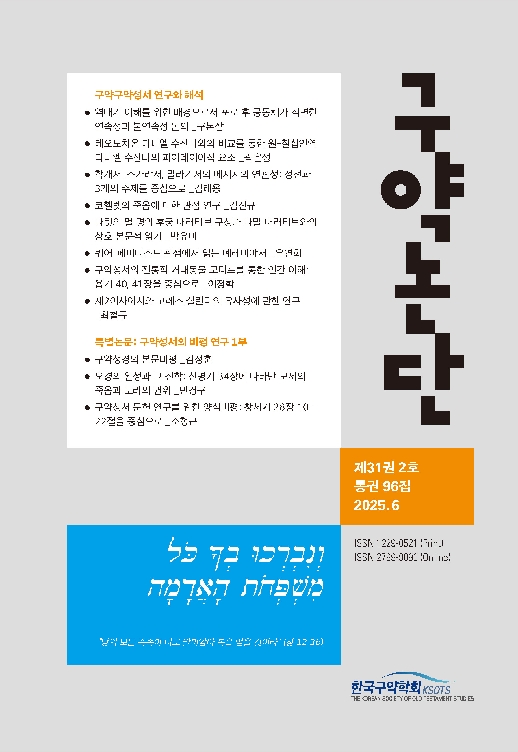본 논문은 칠십인역 다니엘에 포함된 두 수산나 본문 원-칠십인역(OG-수산나)과 테오도치온 역본(Th-수산나)을 비교 분석함으로써, OG-수산나가 지닌 문학적·신학적 의의를 논하고자 한다. 연구의 중심 질문은 다음과 같다. OG-수산나는 Th-수산나와 어떤 문학적 차이를 보이며, 이러한 차이가 본문의 목적과 메시지에 어떤 영향을 미치는가? 특히 OG-수산나가 장로들의 탐욕과 부패를 보다 직접적이고 노골적으로 비판하는 방식은 무엇을 말하며, 그 의도는 무엇인가? 이러한 질문을 헬레니즘 시대에 형성된 유대 파이데이아(paideia) 개념을 통해 논하고자 한다. 먼저 2장에서는 수산나 본문의 개요와 장르, 구조, 위치, 저작 시기 및 OG-수산나와 Th-수산나의 관계에 대해 정리한다. 3장에서는 두 역본의 본문을 대조 분석하여, 특히 OG-수산나가 장로들의 부패와 위선을 어떻게 강조하는지를 중심으로 그 서술 방식의 특징을 논의한다. 4장에서는 헬레니즘 시대와 유대 공동체에서 형성된 파이데이아 개념을 고찰하고, 이를 바탕으로 OG-수산나가 지닌 교육적 목적과 문학적 기능을 분석한다. 특히 OG-수산나는 이야기의 결말에서 이상적인 청년 교육에 대해 직접적으로 언급함으로써, 공동체의 윤리적 재생산과 도덕 교육이라는 파이데이아의 목적을 명시적으로 드러낸다. 본 연구는 이러한 관점을 통해 OG-수산나가 단순한 도덕담이나 외경적 전승이 아니라, 토라에 기반한 정의, 경건, 지혜, 공동체 책임을 내면화한 이상적 인간 형성을 추구하는 교육 서사임을 밝히고자 한다.
This paper aims to discuss the literary and theological significance of the Old Greek (OG) Susanna by comparatively analyzing the two Susanna texts included in the Septuagint Daniel: the Old Greek version (OG-Susanna) and the Theodotionic version (Th-Susanna). The central questions guiding this research are: What literary differences exist between OG-Susanna and Th-Susanna, and how do these differences impact the purpose and message of the text? Specifically, what does OG-Susanna's more direct and explicit critique of the elders' greed and corruption convey, and what is its underlying intention? These questions will be explored through the lens of the concept of Jewish paideia, which emerged during the Hellenistic period. Chapter 2 provides an overview of the Susanna texts, including their genre, structure, placement, dating, and the relationship between OG-Susanna and Th-Susanna. Chapter 3 presents a comparative analysis of the two versions, focusing on the distinct narrative characteristics of OG-Susanna, particularly how it emphasizes the corruption and hypocrisy of the elders. Chapter 4 examines the concept of paideia as it developed in the Hellenistic era and within Jewish communities. Based on this, it analyzes the educational purpose and literary function of OG-Susanna. Notably, OG-Susanna explicitly mentions ideal youth education at the story's conclusion, thereby clearly articulating the purpose of paideia: ethical reproduction and moral instruction within the community. Through this perspective, the present study seeks to demonstrate that OG-Susanna is not merely a moral tale or an apocryphal tradition, but rather an educational narrative that pursues the formation of an ideal human being who has internalized Torah-based justice, piety, wisdom, and communal responsibility.







